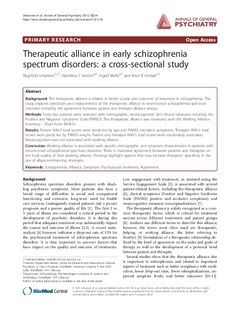Working Alliance and Service Engagement in Early Schizophrenia Spectrum Disorders
Abstract
The first two to five years of illness are considered a critical period in the development of psychotic disorders. It is during this period that adequate treatment may substantially impact the course and outcome of illness. Early intervention has thus become a primary goal. Guidelines recommend combined treatments that include both psychopharmacological and psychosocial treatments. A wide range of psychosocial treatments are offered and established as evidence based.
In schizophrenia spectrum disorders poor patient engagement can be an obstacle to treatment success, and drop-out represents a major challenge. The construct of engagement in relation to mental health services is complex and is often studied through various components, such as alliance, compliance, and measures of attendance. The therapeutic alliance is identified as important in schizophrenia both for engagement and outcome, relating to important aspects of treatment such as better compliance with medication, lower drop-out rates, fewer rehospitalizations and improved symptom levels. This warrants identification of factors that may influence service engagement and the quality of the therapeutic alliance.
Characteristics of the working alliance, and factors associated with quality of the working alliance and engagement with services, in the early phase of schizophrenia spectrum disorders were studied.
All three papers included in this thesis originate from the ongoing Thematically Organized Psychosis (TOP) research study. The main inclusion criterion for all three studies was an early phase schizophrenia spectrum psychosis (including schizophrenia, schizophreniform disorder, schizoaffective disorder, and delusional disorder. Study I, also included psychosis not otherwise specified, and brief psychosis) according to the Diagnostic and Statistical Manual of Mental Disorders, Fourth Edition (DSM-IV). In study I, 148 patients were included with first-episode schizophrenia spectrum psychosis (in- and outpatients), recruited from all major psychiatric treatment units in Oslo, Norway. The data from studies II and III included 42 patients with early schizophrenia spectrum psychosis, included from out- and inpatient services at the Division of Psychiatry, St. Olav’s Hospital, Trondheim University Hospital, Norway. Data were analyzed on clinical and neurocognitive variables as well as engagement with services in study I. Clinical and neurocognitive variables as well as working alliance were analyzed in study II. Clinical variables, traits of personality, interpersonal problems and working alliance were analyzed in study III.
Taken together, the results of the studies showed, that patients’ conceptualizing ability, together with positive and excitative symptoms explained 18% (adjusted R²) of the variance in availability to treatment. Patients’ age, level of excitative symptoms and Submissive/Hostile interpersonal problems accounted for 37% (R²) of the observed variance patient total working alliance scores. Patients’ insight and personality trait of Agreeableness accounted for 23% (R²) of the observed variance in therapist total working alliance scores.
In conclusion, this thesis provide new knowledge about the importance of recognizing patients’ individual profiles of symptoms, characteristic basic traits of personality and interpersonal problems, with regards to their possible impact on the quality of the working alliance in early schizophrenia spectrum disorders, as well as the relation between active psychotic symptoms, cognition and patients availability to treatment in the early phase of illness. These findings may improve therapist interventions when providing psychosocial treatment to patients with early schizophrenia spectrum disorders.
Has parts
Johansen, Ragnhild; Hestad, Knut; Iversen, Valentina C; Agartz, Ingrid; Sundet, Kjetil; Andreassen, Ole A; Melle, Ingrid. Cognitive and clinical factors are associated with service engagement in early-phase schizophrenia spectrum disorders.. Journal of Nervous and Mental Disease. (ISSN 0022-3018). 199(3): 176-82, 2011. 10.1097/NMD.0b013e31820bc2f9. 21346488.Johansen, Ragnhild; Iversen, Valentina C; Melle, Ingrid; Hestad, Knut A. Therapeutic alliance in early schizophrenia spectrum disorders: a cross-sectional study. Annals of General Psychiatry. 12, 2013. 10.1186/1744-859X-12-14.
Johansen, Ragnhild; Melle, Ingrid; Iversen, Valentina Cabral; Hestad, Knut. Personality traits, interpersonal problems and therapeutic alliance in early schizophrenia spectrum disorders.. Comprehensive Psychiatry. (ISSN 0010-440X). 54(8): 1169-76, 2013. 10.1016/j.comppsych.2013.05.016. 23856387.
